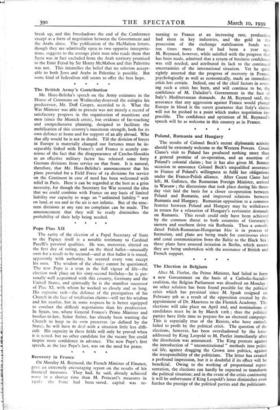The British Army's Contribution Mr. Hore-Belisha's speech on the Army
estimates in the House of Commons on Wednesday deserved the eulogies his predecessor, Mr. Duff Cooper, accorded to it. What the War Minister was able to present was not merely a record of satisfactory progress in the organisation of munitions and men (since the Munich crisis), but evidence of far-reaching and comprehensive planning, designed to facilitate the mobilisation of this country's maximum strength, both for its own defence at home and for support of an ally abroad. Who that ally would be is not in doubt. Till the division of forces in Europe is materially changed our fortunes must be in- separably linked with France's and France is acutely con- scious of the fact that the disappearance of Czecho-Slovakia as an effective military factor has released some forty German divisions from service on that front. It is natural, therefore, that Mr. Hore-Belisha's announcement that his plans provided for a Field Force of 19 divisions for service on the Continent in case of need has been welcomed with relief in Paris. Here it can be regarded at the best as a grim necessity, for though the Secretary for War scouted the idea that we could combine with France on any basis of limited liability our capacity to wage an "unlimited liability" war on land, at sea and in the air is not infinite. But of the nine- teen divisions at any rate no complaint can be made. The announcement that they will be ready diminishes the probability of their help being needed.










































 Previous page
Previous page